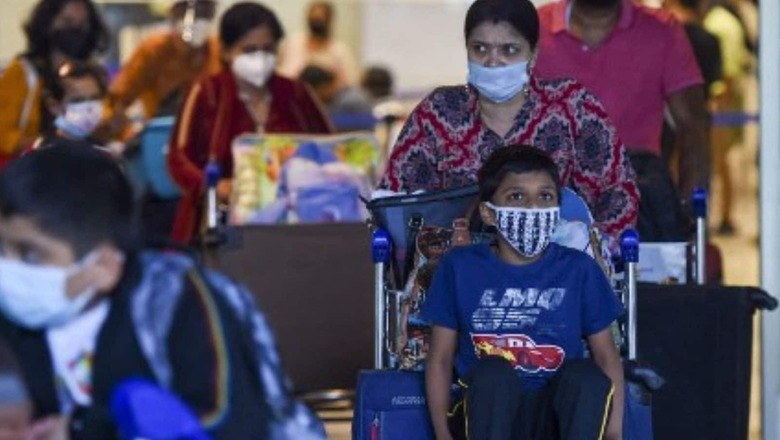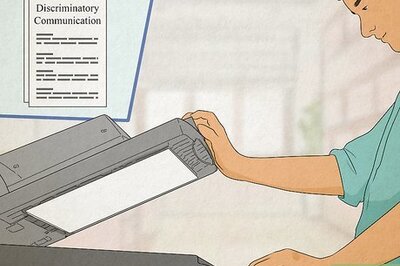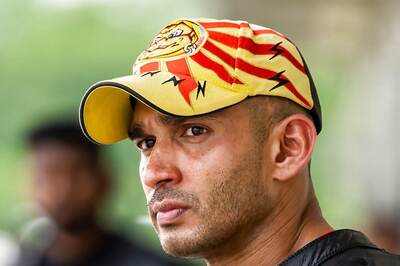
views
After India joined a growing list of countries with coronavirus cases of the Omicron variant, the Union Health Ministry has issued a list of frequently answered questions (FAQ) on the new variant. Designated a “highly transmissible variant of concern” by the WHO, Omicron has been detected in two samples collected in Karnataka.
Of the two people who tested positive for Omicron variant in India, one is a 66-year-old South African national who had tested negative on departure, while the other is a 46-year-old local doctor with no travel history.
A member of the Covid-19 task force said strict vigilance, genome sequencing, border surveillance and vaccination are measures necessary to tackle the new variant of the coronavirus.
Elaborate arrangements have been made at Delhi and Mumbai airports to screen passengers for Covid-19, with special focus on international travellers and more so on those coming in from ‘at risk’ countries.
EXPLAINED | As Omicron Surfaces In India, How Genomic Surveillance Can Help Us Stay A Step Ahead Of Variants
While experts are saying the variant appears to be stable with high transmissibility but low virulence, there is still fear that it may cause more reinfections than Delta or Beta Covid variants.
There are, however, many more questions to be answered due to the constellation of mutations carried by the variant. Scientists and experts across the world are working on questions regarding how good the new variant is at evading immunity from vaccines or past illness, how severe the symptoms will be as compared with previous variants, and how it will affect different age groups.
Sourced from WHO and government data, here is the FAQ issued by the ministry of health and family welfare on the Omicron variant of SARS-CoV-2:
What is Omicron and why is it a variant of concern (VoC)?
Omicron is a new variant of SARS-CoV-2 (novel coronavirus) recently reported from South Africa on November 24. It was first identified as B.1.1.529 variant and then named Omicron, which is the 15th letter of the Greek alphabet.
The new variant has shown a large number of mutations, especially more than 30, on the spike protein used by the virus to enter human cells. Given the collection of mutations in Omicron, which earlier individually have been associated with increased infectivity, immune evasion and a sudden rise in number of positive cases in South Africa, the WHO has declared Omicron a VoC.
How concerned should we be about the new variant?
The WHO declares a variant as VoC after assessment when there is increase in transmissibility or detrimental change in Covid-19 epidemiology. Other factors include increase in virulence or change in clinical disease presentation, decrease in effectiveness of public health and social measures or available diagnostics, vaccines, therapeutics.
Omicron has been declared VoC based on observed mutations, their predicted features of increased transmission and immune evasion, and preliminary evidence of detrimental change in Covid-19 epidemiology, such as increased reinfections. Definitive evidence on increased remission and immune evasion is awaited.
Will there be a third wave?
Omicron cases are increasingly being reported from countries outside South Africa. Given its characteristics, it is likely to spread to more countries including India. The scale and magnitude of rise in cases and, most importantly, severity of disease are still not clear. Given the fast pace of vaccination in India and high exposure to delta variant, severity is anticipated to be low. Scientific evidence, however, is still evolving.
Will existing vaccines work against Omicron?
While there is no evidence to suggest that existing vaccines do not work on Omicron, some of the mutations reported on the spike gene may decrease their efficacy. Vaccine protection is also by antibodies as well as by cellular immunity, which is expected to be relatively better preserved. Hence, vaccines are expected to still offer protection against severe disease. Vaccination is crucial and, if eligible but not vaccinated, you should get vaccinated.
What are the precautions to be taken?
Precautions and steps to be taken remain same as before. It is essential to mask, be fully vaccinated with two doses of a Covid-19 vaccine, maintain social distancing and good ventilation.
How is India responding?
The central government is closely monitoring the situation and issuing suitable guidelines. The scientific and medical community is geared up for developing and deploying diagnostics, carrying out genomic surveillance, generating evidence about viral and epidemiological characteristics, and development of therapeutics.
Can methods used currently detect omicron?
The most accepted and commonly used method of diagnostics for SARS-CoV-2 variant is RT-PCR method. This method detects specific genes in the virus, such as spike (S), enveloped (E) and nucleocapsid (N), etc, to confirm the presence of virus. In case of Omicron, however, as the S gene is heavily mutated, some of the primers may lead to results indicating its absence (called S gene drop out). This particular S gene drop out along with detection of other viral genes could be used as a diagnostic feature for Omicron. For final confirmation, however, genomic sequencing is required.
Why do variants occur?
Variants are a normal part of evolution, and as long as the virus is able to infect, replicate and transmit, it will continue to evolve. Not all variants are dangerous and, more often than not, they are not noticed. Variants only gain prominence when they are more infectious and have the ability to re-infect. The most important step to avoid more variants is to reduce number of infections.
Read all the Latest India News here

















Comments
0 comment